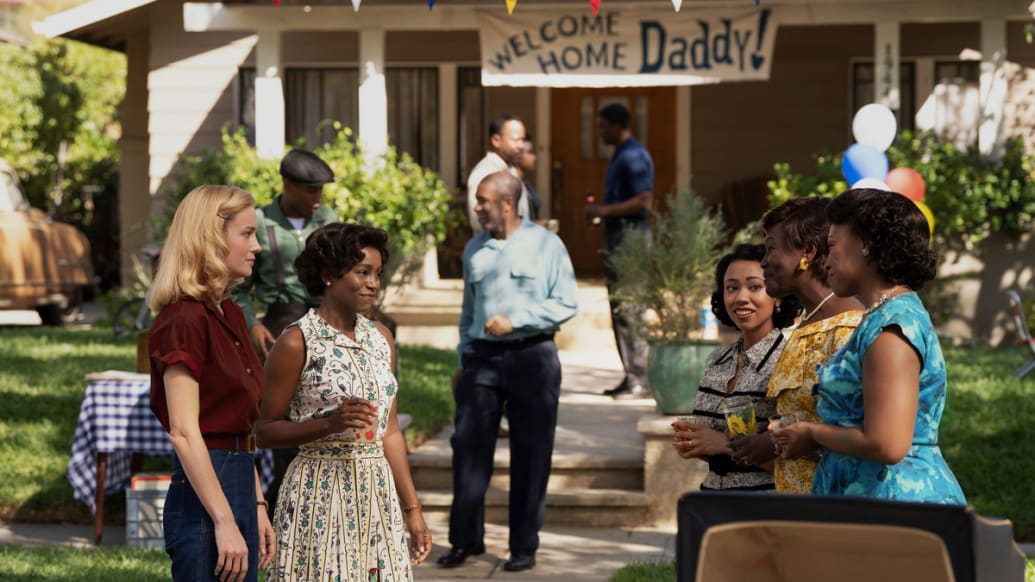dropped. Was that a goal, to turn it around quickly?
Lee Eisenberg: The development of [this project] was happening in concert with the book becoming what it eventually became. I had read the book and just fell in love with it for all of the reasons that everyone else in the world has fallen in love with it. I put in an incoming call to Apple, which I’ve never done before! Usually, material comes to me and Sarah, and people say, “Hey, would you consider working on the show?” With this one, I was like, “Hello! I would like to be on your show! Please! If there’s anything I can do!”
Sarah Adina Smith: I do think it worked to the show’s benefit that we were beholden to Brie’s very busy schedule. That probably helped catalyze it and get it going faster than it might have [otherwise].
What was the hardest part about the adaptation process?
Eisenberg: There was definitely a pressure that so many people felt such a connection to the material and to Elizabeth as a character. I wanted to honor that and not blow it. I didn’t want to do anything that would feel less than the book in any way. There was such a high bar from the book that it was really scary. The book just touches on so many different things and there’s so many twists and turns. I wanted to leave myself the opportunity to truly adapt it, but also honor it, so that the fans of the book didn’t feel like, “What did you do with my dear beloved book?”
Smith: I feel like, when you read a book, it exists in your imagination. Oftentimes, you don’t read it all in one sitting. It’s over a period of time. There’s pacing and your mind has time to digest it, it has time to evolve and grow in your mind. One thing I was aware of was wanting to shoot the show with a rhythm and pace that allowed for some negative space as well. Normally, in TV and film, you gotta keep it moving. But I wanted to shoot it simply with not too many cuts, in a way that could allow the audience to put themselves into it.
Eisenberg: By shooting the first two episodes as a block, [Smith] really established a look and a tone for the subsequent six episodes. The pace of the dialogue and the way that Sarah shot it, we were able to live in the scenes really well. The show always felt like there was movement. There was an initial fear when we first got into it, like, how do you make two people in a lab shaking beakers and making sure that a clear one turns into a foggy substance compelling for an audience?
The show is dealing with gender politics in the 1950s and ’60s that somehow still feel relevant today. Why do you think that is?
Eisenberg: From the beginning, we never set out to make a show that was political with a capital P. Everything was in service of the character. We talked about all of those things, but really, we want characters to go on a journey. Those experiences inform that journey. An example of that is in Episode 1, when Calvin and Elizabeth are walking down the hall and he says, “Why would anyone make a judgment on someone’s talent based on something as non-determinative as gender?” She stops him and she says, “Calvin. How many female scientists can you name aside from Marie Curie?” He just stops, and she goes, “There you go.”
As much as society has evolved and there has been tremendous progress from the 1950s to today, there’s so much more that needs to happen. In these moments, hopefully, the audience stops in their tracks and says, “Oh, right.” It’s a story of white male privilege without stopping to do an entire episode that feels like an after school special about privilege. Elizabeth, our heroine, she’s faced with obstacle after obstacle throughout the city. We watch her come to discover her white female privilege.
This series really runs the gamut of the book, but do you see a Season 2 on the horizon?
Eisenberg: Brie has done quite well for herself living in the Marvel Cinematic Universe, so if there ever was an opportunity to create the LICCU, the Lessons in Chemistry Cinematic Universe, [we’d do it]! [Laughs] We do not have any ideas as of yet, and we feel that the story was complete. But if it made sense to continue telling Elizabeth and Mad and Harriet’s stories going forward, I think we would all jump at the opportunity.










